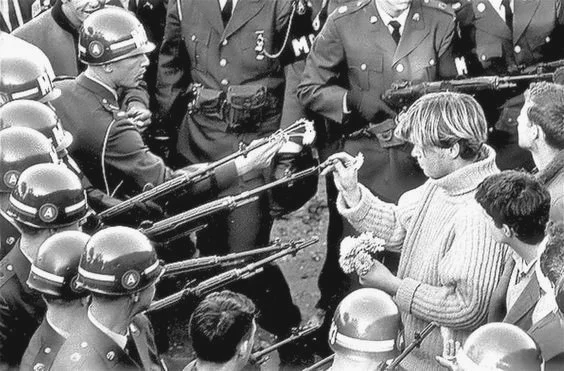When we expand democracy, who gets left out?
This question has long confounded movements to promote human rights, human dignity, and human security. In Queer and Present Dangers: Sexuality, Masculinity, and the Sixties — my first book, under advance contract from the University of North Carolina Press — I investigate how Sixties activists struggled to incorporate sexuality and gender into their visions of political and cultural change.
For many young Americans in the Sixties, their generation was defined by the struggle to secure civil rights, end the Vietnam War, organize for economic justice, and escape the stifling conformity of the Fifties. But many men in the New Left, who not long before had become the first generation of teenage boys to smuggle copies of Playboy under their mattresses, now faced regular harassment for being “unmanly” for growing their hair long, for evading the draft and for refusing the trappings of adulthood that was their supposed birthright as white, middle-class American men. In response, they built a protest culture thoroughly infused with a vigorous heterosexuality, reclaiming their masculinity by bragging about their sexual prowess with women and gay-baiting their rivals. Their own "normal" masculinity restored, the men of the New Left reasserted the legitimacy of their direct challenge to the racial, economic, and militarist order of Cold War politics and culture.
My book draws upon 70 original oral history interviews, extensive archival research, and close analysis of Sixties-era memoirs, underground newspapers, films, cartoons, songs, and other cultural artifacts. Covering the Vietnam War era, I show how LGBTQ people moved through the New Left, the civil rights and antiwar movements, Second Wave feminism, and the Sixties counterculture, navigating deeply homophobic protest culture. But even as gay-baiting drove some LGBTQ people deeper into the closet or out of activism altogether, many others developed the organizing skills and political frameworks that they used to organize the post-Stonewall gay liberation and lesbian-feminist movements. Ultimately, the roots of the last half-century of progressive LGBTQ politics are grounded in the movements of the Sixties.
Queer and Present Dangers holds urgent lessons for today's social justice activists. The movements of the Sixties, though openly spurning Cold War cultural conventions, nonetheless replicated the very gender hierarchies and sexual norms of the very society against which they protested. This failure of political imagination necessarily limited the extent of social transformation that they could achieve, and the homophobia of these movement cultures drove away highly skilled political organizers. At the same time, the daily work of creating change opened the space for heterosexual movement participants to evolve and embrace LGBTQ issues as part of a broader social justice agenda. In this messy work of building freedom, justice. and peace lay the origins of the inclusive, intersectional organizing we now do in order to achieve that dream of a more democratic society.
In 2019, as part of the Queer America podcast — a series sponsored by the Southern Poverty Law Center’s Learning for Justice project — I published two episodes based on my book research and my teaching of the history of the 1950s and 1950s. “Re-Examining the 1960s, Part One” and “Part Two” are available here and through all podcast services, including Apple, Google, and Spotify.
I have also published several articles, book chapters, and interviews drawing upon my research from Queer and Present Dangers. These include:
“Queers of Hope, Gays of Rage: Re-Examining the Sixties in the Classroom,” in Susan K. Freeman and Leila J. Rupp (eds.), Understanding and Teaching U.S. Lesbian, Gay, Bisexual, and Transgender History (University of Wisconsin Press, 2014; 2017, 2nd ed.). Winner of the 2015 Lambda Literary Award for Best LGBT Anthology.
“The Long Sixties,” Magazine of History (March 2006)
“Queer Harvests: Homosexuality, the U.S. New Left, and the Venceremos Brigades to Cuba,” Radical History Review 89 (Spring 2004). Revised version published in Heidi Tinsman and Sandhya Shukla (eds.), Imagining Our Americas: Toward a Transnational Frame (Duke University Press, 2007).
“Interview with Amber Hollibaugh,” Peace and Change, 29, 2 (April 2004)
“Losing Our Kids: Queer Perspectives on the Chicago Seven Conspiracy Trial,” in John McMillian and Paul Buhle (eds.), The New Left Revisited (Temple University Press, 2003).
My research for Queer and Present Dangers has received generous funding from:
Harvard University
Duke University
The University of Michigan
